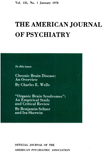Amphetamine Psychosis: A "Model" Schizophrenia Mediated by Catecholamines
Abstract
Because of its close clinical similarity to acute paranoid schizophrenia, amphetamine psychosis may serve as a useful experimental model for schizophrenia. Molecular and clinical studies suggest that both the schizophrenia-like symptoms of amphetamine psychosis and the specific ability of phenothiazines to relieve the symptoms of schizophrenia and amphetamine psychosis may be the result of interactions with dopamine systems in the brain. The author discusses some implications of the roles dopamine and norepinephrine may play in mediating some schizophrenic symptoms.
Access content
To read the fulltext, please use one of the options below to sign in or purchase access.- Personal login
- Institutional Login
- Sign in via OpenAthens
- Register for access
-
Please login/register if you wish to pair your device and check access availability.
Not a subscriber?
PsychiatryOnline subscription options offer access to the DSM-5 library, books, journals, CME, and patient resources. This all-in-one virtual library provides psychiatrists and mental health professionals with key resources for diagnosis, treatment, research, and professional development.
Need more help? PsychiatryOnline Customer Service may be reached by emailing [email protected] or by calling 800-368-5777 (in the U.S.) or 703-907-7322 (outside the U.S.).



